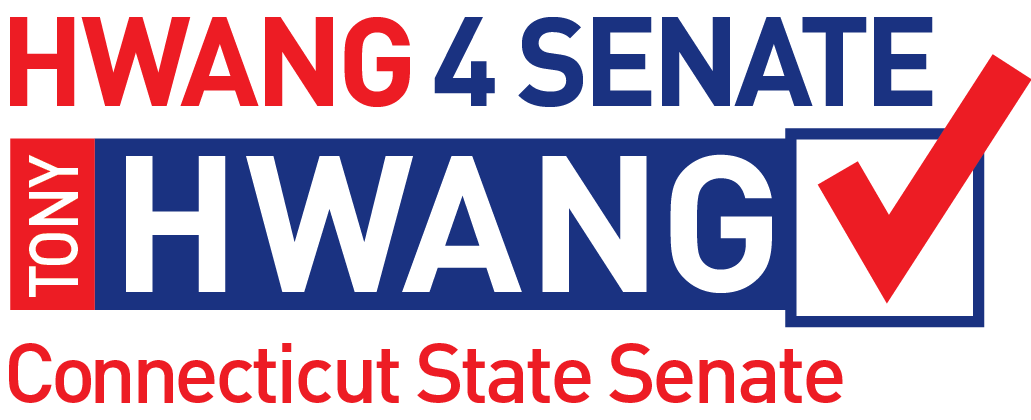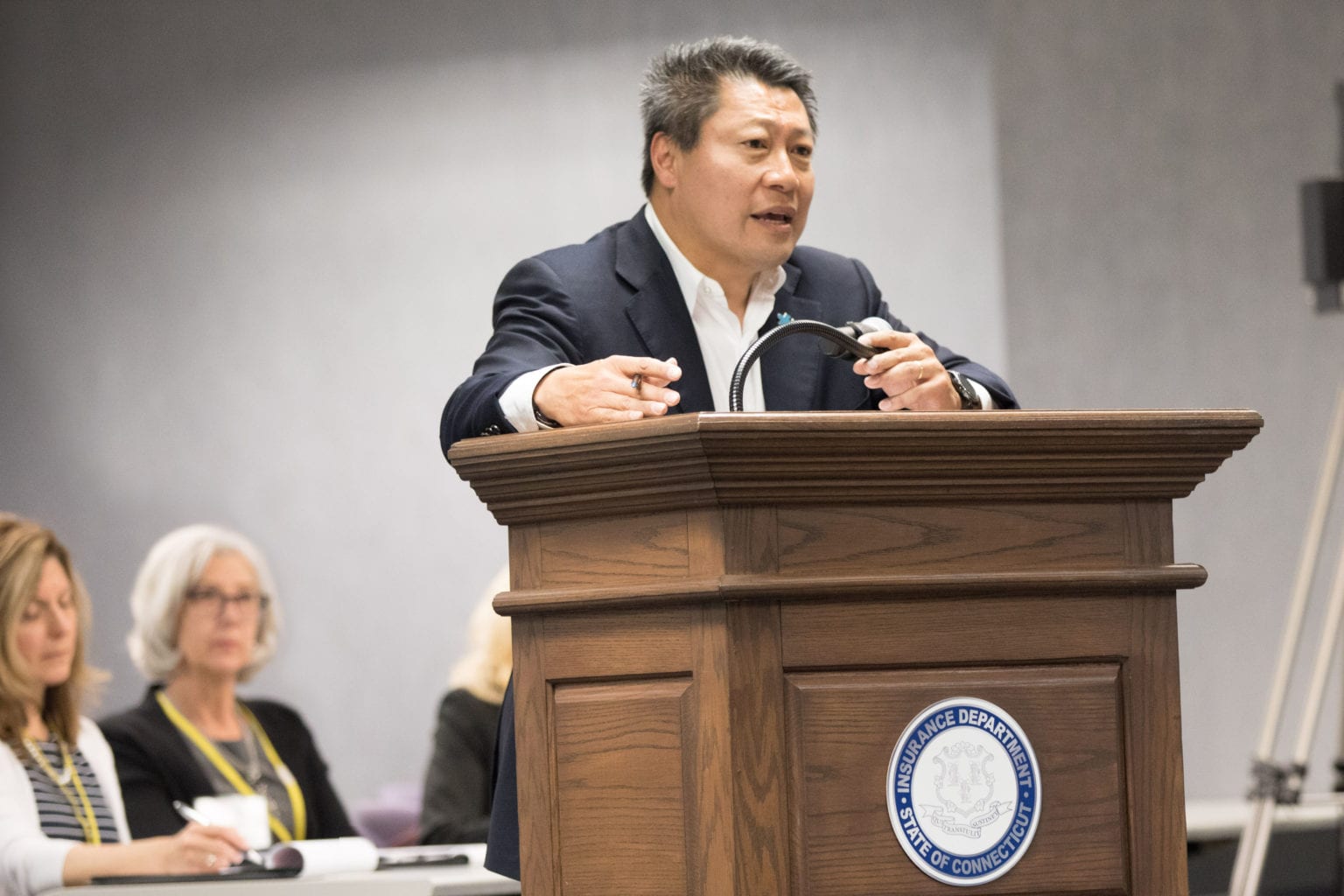David vs. Goliath – Unaffordable Health Insurance Costs
By State Senator Tony Hwang
No transparency. No predictability. A rigged game. A broken system.
These are some of the thoughts that crossed my mind as I entered a Hartford hearing room June 14 to testify – yet again – against outrageous, unaffordable, and unacceptable double digit health insurance rate hike proposals.
Imagine: A 33.8 percent rate hike? Or, how about a 17.5 percent rate hike?
Then imagine those hikes coming ON TOP of all the past hikes which have risen more than 100+ percent in recent years.
The Affordable Care Act has proven to be anything but affordable.
So there I was, in an obscure 7th floor office building in the middle of a work day in June.
I was one of the few members of the public in attendance.
You see, the people I represent oppose these unaffordable and unfair annual rate hikes, but they cannot afford to take a day off to drive to Hartford and speak their minds.
I brought the anti-rate hike comments I have received at Tony.Hwang@cga.ct.gov and submitted their comments directly to the Insurance Department.
In my testimony, I told state insurance regulators and insurance company executives that unpredictable health insurance rate hikes year after year are hurting middle class families and small businesses in Connecticut.
I told them how people are frustrated and angry.
I told them people feel the deck is stacked against Connecticut consumers.
I noted how this has been a wild and unsettling roller coaster ride of rate increases without any sense of predictability. These huge rate increases are unsustainable, the reasons given for the increases are weak and disguised in complex legal speak, and even garnering basic information about the public hearing required dedication, persistence and time.
Don’t like the sound of 33.8 percent rate hikes? Me either.
Want the transparent state government you deserve? Me too.
You can still submit your comments on these unaffordable rate hikes until July 1.
Submit testimony at http://www.ct.gov/cid/cwp/view.asp?a=4059&Q=585260 or access the link via SenatorHwang.com.
Or you can send me your comments directly to me at Tony.Hwang@cga.ct.gov .
Your submissions can be as brief as you like.
These rate hikes are tax hikes on you, your business, and your families.
I thank you in advance for joining me in this very worthy David vs. Goliath fight.
Raise your voices today: otherwise 33.8 percent may one day seem to be a “minor” rate increase.
*Sen. Hwang represents Easton, Fairfield, Newtown, Weston and Westport. On the web: www.SenatorHwang.com
Sen. Hwang on huge proposed rate hikes: “…a rigged system.”
Two of the state’s largest health insurers came face to face with hostile customers and dissenting advocates at a hearing Wednesday over another year of requests for double-digit rate hikes.
The stakes are even higher this year because the state Insurance Department’s final decision on the rate requests will influence whether the two remaining insurers on Connecticut’s health insurance exchange, Access Health CT, return in 2018.
The Insurance Department selected those two insurers, Anthem and ConnectiCare Benefits, for public hearings as part of an ongoing review of the sizable rate hikes they are requesting. The insurers say the increases are necessary to stem financial losses in their individual and small-group plans, both on and off the exchange.
Anthem is requesting a 33.8 percent average rate increase for its 35,000 customers enrolled through Access Health, while ConnectiCare wants a 17.5 percent average increase for its 51,000 on-exchange customers. The averages are higher than those sought last year.
Off the exchange, ConnectiCare is seeking a 28.3 percent average rate increase for nearly all of its 43,000 customers. Anthem charges the same rates for its on- and off-exchange plans.
Given the Affordable Care Act’s uncertain future, officials from both companies said their on-exchange rate requests could grow even higher in coming weeks. Tu Nguyen, Anthem’s chief actuary, said his company’s rate request would be 20 percent higher if subsidies for low-income individuals are abandoned.
Anthem and ConnectiCare have said previously they are considering leaving the exchange.
Anthem, ConnectiCare and insurers across the nation are awaiting President Donald Trump’s decision on whether to continue cost-sharing reduction payments that reduce out-of-pocket costs – mainly deductibles and co-payments – for low and moderate-income individuals and families who qualify. Trump has made no commitment to continue the payments, which would bring insurers about $7 billion this year. Many insurers say they won’t participate in ACA exchanges without the payments or will raise proposed rates even higher, by an average of almost 20 percent.
Anthem and ConnectiCare would have the opportunity refile their on-exchange rate requests for 2018 if it becomes clear that the CSR payments will end, Insurance Department officials said.
The Insurance Department is responsible for evaluating all health insurance rate requests annually and can adjust or reject them if they are excessive, inadequate or unfairly discriminatory. State law prohibits the department from considering other factors, such as affordability or the potential impact on the state’s exchange.
About a dozen speakers at Wednesday’s public hearings all urged the department to reject the requests, saying it would cost them hundreds of dollars more per month. Brenda Shipley, a Branford resident and Anthem customer, said it “feels like extortion.”
“Health insurance premiums in Connecticut are already some of the highest in the country,” Shipley said. “Anthem’s premium rate increases would hit consumer pocketbooks at the same time property taxes are anticipated to increase because of our state’s budget crisis and at the very same time job and wage growth in this state remains stagnant.”
Garry Malone of Berlin said raising rates sharply is counterintuitive because he believed it would reduce the number of customers paying into the pool. He decried Anthem’s request as unreasonable.
“I don’t know of anyone in this room who got a 33 percent raise,” Malone said.
Jennifer Lovett, CEO of Crystal Financial Loan Services, offered a small business perspective.
“I have a lot of people who don’t qualify for subsidies,” Lovett said. “They are the ones who are taking the brunt of these increases.”
Sen. Tony Hwang, R-Fairfield, was the only public official to testify at either of the hearings. He said during ConnectiCare’s hearing that it felt “like déjà vu all over again.”
“We’ve done this pretty much every year,” Hwang said. “In the past years, we’ve had a cumulative increase of over 100 percent plus of health insurance rate increases. Those are put upon people that have no choice. They feel that it’s a rigged system.”
Despite the criticism, the insurers defended their requests and said the higher rates are needed to avoid further losses on the exchange.
“We continue to be committed to the people of our state and recognize the value the ACA has brought to our friends and neighbors,” said Roberta Wachtelhausen, a senior vice president at ConnectiCare. “However, our company has been challenged by flawed federal programs, unmet commitments of the ACA and the acceleration of the cost and use of care.”
“Further, the uncertainty created by the current political and regulatory environment, coupled with the underlying increasing costs of care, require the rates as filed, to ensure we can sustain our business and continue to offer high quality health insurance,” she added.
Actuaries from both Anthem and ConnectiCare said they expect the morbidity rate to continue growing in the coming year, meaning they expect a higher percentage of their customers to be more prone to illness and disease. That means they would have to pay out more per customer over the course of a year.
Mary van der Heijde, who works with ConnectiCare as a consulting actuary, said even though no federal laws have been repealed yet, the uncertainty alone is causing change. If the White House eliminates the ACA’s cost-sharing reduction subsidies or advance premium tax credits, said Neil Kelsey, ConnectiCare’s chief actuary, his company would have to request higher rates.
The Insurance Department, which is not obligated to hold public hearings on rate requests, has made it a point to hold them in each of the past four years, said Donna Tommelleo, a spokeswoman for the department. The hearings allow members of the public to voice concerns and give state officials a public venue to scrutinize the requests.
However, in what has proven to be a recurring problem, the Insurance Department received complaints about the timing and location of the hearings. Last year’s hearings were held in early August and the previous year’s in July. Both also prompted complaints. Attendance at this year’s hearing was particularly low in comparison to past years.
At least one organization that routinely attends the hearings made a point to skip them. The Universal Health Care Foundation said the process is “unwelcoming of real public participation and too narrow in its scope.”
“The Foundation is particularly concerned that the June 14 hearings are scheduled too early, and will be rendered moot by the challenges to the health insurance marketplace,” said the group’s president, Frances G. Padilla. “The 2018 rate requests assume that the insurers will receive cost sharing reduction payments, which the Trump administration may end.”
“By holding hearings later in the summer, there could be more clarity about the specific challenges the insurance companies will face,” Padilla added.
“The process is broken.” – Sen. Hwang on double-digit health insurance rate hikes
Consumers and a state legislator on Wednesday urged Connecticut insurance regulators to reject double-digit rate increases sought by two health insurers.
Anthem Health Plans is seeking an average 33.8 percent increase for policies, including those sold under Access Health CT, the state health insurance exchange under the Affordable Care Act. ConnectiCare Benefits Inc. is looking to boost its rate by an average 17.5 percent for policies sold on the exchange. Both defended their proposals at a Connecticut Insurance Department hearing in Hartford.
The two insurers said they have little choice but to seek the higher rates for 2018. Younger and healthier people are shunning the Affordable Care Act, or Obamacare, leaving a risk pool of sicker people whose reliance on health care is driving up costs, they said.
The insurers also say federal health insurance policy is unsettled as President Trump and the Republican-led Congress have yet to agree on health care legislation that can pass the House and Senate.
Garry Malone of Berlin compared Anthem’s request unfavorably to stagnant wages and asked regulators to turn it down.
“I don’t know of anyone in this room who’s had a 33.8 percent raise,” said Malone, 58. “I’d like you think about everybody. Even the little guy.”
Brenda Shipley of Branford sharply criticized Anthem. She told the panel of three officials – a hearing officer, lawyer and insurance actuary – that the health insurer is “actively sabotaging” Access Health, Connecticut’s health insurance exchange, by making coverage unaffordable.
“Unfortunately, the process is broken,” he said.
Donna Tommelleo, spokeswoman for the Insurance Department, said officials have accommodated the pubic by moving hearings up from late summer, a popular vacation time, to late spring and extended the online comment period to two weeks after the hearing.
Jennifer Lovett, of Health Agents for America Inc., said Anthem’s request for 2018 would increase rates by more than 80 percent over two years following a previous increase.
“People cannot afford it,” she said. “I’m begging you, please help these people. We get the calls. Not you.”
Other critics said the increases are particularly painful because economic growth in Connecticut is slow and public services are being cut by the state as it struggles with reduced revenue.
Stephen Hunt, an Avon insurance agent, said the issue is the rising cost of medical care, such as tests and prescriptions. He asked regulators to keep health insurance rate increases “reasonable.”
James Augur, regional vice president for sales at Anthem, told regulators that the industry faces an “uncertain environment.”
House Republicans last month narrowly passed legislation to repeal and replace President Barack Obama’s signature domestic health care program. The bill faces a rewrite and strong opposition from minority Democrats in the Senate.
Anthem said its proposed cost increase, which would affect about 35,000 policyholders, reflects the preference of younger, healthier people to pay the penalty required by the federal law to avoid buying Obamacare insurance. Higher costs have followed, with a greater number of less healthy people using insurance.
Another source of uncertainty that Augur cited is whether the federal government will continue to fund a subsidy known as a cost sharing reduction that lowers the amount paid for deductibles, copayments, and coinsurance.
Wachtelhausen, too, took aim at growing uncertainty in the market as Congress considers changes to Obamacare. “The rules of 2016 and beyond need to be known,” she said.
Hospital consolidations and pricey prescription drugs also are contributing to higher insurance costs, ConnectiCare said. Its policy rate increase would affect nearly 51,000 people.
Insurance Commissioner Katharine Wade is expected to make a decision on the rate increase proposals later this summer or fall.
In all, 10 health insurers are seeking rate increases for next year averaging 15.2 percent to 33.8 percent for individual plans. The increases for premium plans range from 19 percent to 52 percent.
For small group insurance – employers with 50 or fewer workers – average rate requests are up 3.6 percent to 31.6 percent.
The increases would affect 270,000 insured customers, state insurance officials said.


